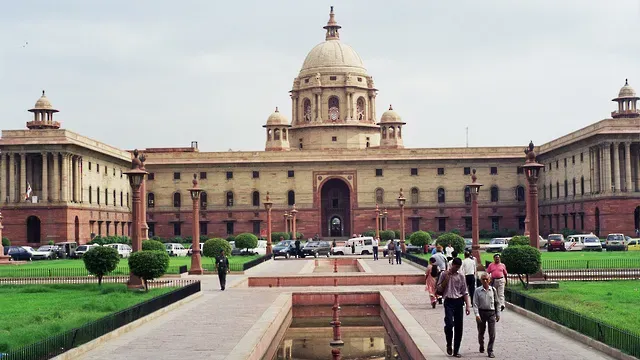Lights On Briefing: India's climate diplomacy, ADB divests and more
What you need to know this week

Happy Tuesday and welcome to today's Lights On, a newsletter that brings you the key stories and exclusive intel on energy and climate change in South Asia.
In case you missed it, have a look at this week's interview with RMI's Jagabanta Ningthoujam, where we discuss how India is joining the race for minerals to try and secure the future of its energy transition.
Subscribe here to receive this newsletter in your inbox every week:
India
Connecting continents
The EU and India launched a new ‘Connectivity Partnership’, which will support the creation of new digital, transport and energy networks, as well as opening new corridors for the movement of people and goods. Among other objectives, the partnership wants to boost the EU-India Clean Energy and Climate Partnership, promote regional connectivity to make space for large scale renewables, and advance cooperation in emerging technologies such as floating solar, offshore wind, hydrogen and energy storage.
It’s a hopeful time for India-EU relations, with the two blocs reopening the negotiations for a free trade agreement after an eight-year hiatus. The new partnership is expected to lend weight to the trade efforts.
Plastic diplomacy
The EU is trying to get India on board with its global fight against plastic pollution, according to Reuters. A draft agreement seen by the newswire invited India to “consider endorsing the Leaders’ Pledge for Nature, and effective engagement with like-minded countries on negotiations on a Global Plastics Agreement". The United Nations will hold a meeting in February 2022 and the EU, Rwanda and Peru among others will push for a legally binding agreement to preserve marine and terrestrial ecosystems from plastic waste.
The UK’s climate pitch
It’s been an interesting week for Indian diplomacy, with the UK signing its own partnership agreement with the Modi government after leaving the EU. The bespoke 2030 roadmap involves many of the themes discussed with the UK’s biggest neighbour, including trade, investment, technological collaboration and of course climate change. On this front, the partnership will facilitate green finance flows, boost clean energy and transport development, and enhance adaptation strategies.
Power discord
Industry bodies are up in arms against the new update of the National Electricity Policy, which was presented on 28 April and proposes, among other measures, a re-modernisation of old power plants, transmission improvements including enhanced cross border connectivity, and an aggressive restructuring of the distribution sector. “This sector,” the draft says, “is marred with many inefficiencies like high AT&C losses, inadequate system planning, poor upkeep and maintenance of equipment etc which are affecting the financial health of the discoms, and leading [to] poor consumer satisfaction.” The government has proposed a public-private partnership model to correct the sector’s chronic inefficiencies, but the All India Power Engineers Federation rejected the idea citing the moment of crisis that would enable its proponents to avoid proper scrutiny.
Bangladesh
Indian solar by the Jamuna
As part of the country’s efforts to increase its share of renewables, and after failing to meet its relatively modest 10 percent target last year, the Bangladeshi government teamed up with India for the construction of a 100MW solar park in the northeast of the country, near the Jamuna river. India will lease the equivalent of $131 million, on the condition that the project will include at least 75 percent of Indian goods and services.
The plan should benefit India as much as Bangladesh, as it helps expand its influence and offers a boost to domestic manufacturing, which the Indian government has been trying to promote for a long time, most recently through new Production-Linked Incentives.
Myanmar
The junta’s energy agenda
After seizing power in February, the new military rulers are already setting a new agenda for Myanmar’s economy. The junta approved a $2.5 billion liquified natural gas (LNG) plant as part of a $2.8 billion package of investment projects approved by the Myanmar Investment Commission. The announcement follows months of conflict that have paralysed the country’s economy, leading the credit rating agency Fitch Solutions to predict a 20 percent contraction in the economy this year.
Nepal
A mountain of waste
A new survey by the Nepalese government found that only half of the country’s municipal waste gets collected and processed. The research found that the annual average waste production per municipality hovers around 2,200 metric tonnes, but cities are not well equipped to handle the full amount, mostly due to a lack of manpower. As a result, a lot of the waste ends up in landfills, is dumped along riversides or is burned in the open.
Region
ADB divests
The Asian Development Bank will not be financing new coal projects, as part of its new policy focussed on sustainable growth and a clean energy transition. The bank also said it will promote regional cooperation and cross border energy trading to ensure energy security for all countries. Crucially, the document doesn’t say the bank will stop investing in fossil fuels altogether - natural gas remains an area of interest.
On Twitter this week
1/ IMD/global forecasts indicate the formation of a low-pressure system by end of the week. The conditions are prime, with the warm waters and an active MJO (fading though) that could support cyclogenesis. Will the Arabian Sea see its first cyclone of the year (#Taukte)? pic.twitter.com/mARbMHPDNjMay 10, 2021
Research and further readings:
- Report: Powering Development in Climate Vulnerable Areas: The Role of Decentralized Solar Solutions in India - In India, poor and marginalised communities are also the most exposed to the impacts of climate change. This report looks at the role of decentralised solar systems in bringing energy to climate vulnerable communities, suggesting ways to design systems that are truly resilient.
- Long read: Improved monitoring proposed in the Indian Ocean as climatic and oceanic changes increase - Scientists have proposed a roadmap for upgrading the Indian Ocean Observing System, a multinational ocean monitoring network, to keep tabs on changes in the Indian Ocean. This should help keep track of how biodiversity hotspots are faring, and improve our understanding of the monsoons.
- Study: Increasing risk of glacial lake outburst floods from future Third Pole deglaciation - Climate change could nearly triple the risk of floods across the Himalayan mountain range. This is due to the new lakes that are increasingly appearing in the area as a result of the rapidly retreating glaciers.
- Reportage: Nepal’s first hydropower from a glacial lake - This ground report shows how the threats of new glacial lakes can be curbed, and taken advantage of, by planning new dams to regulate their expansion and harness electricity to serve local communities.
That's all for today! If you like what you read, please consider signing up for free:



